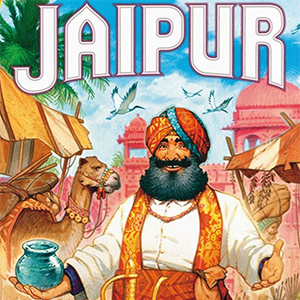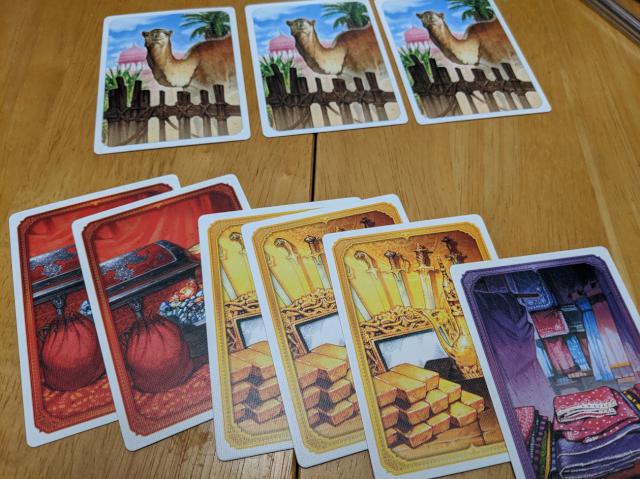
Card trading games can be a bit hit and miss, with the main culprit for a lack of accessibility being overly complex rules, lengthy games or a lack of inspiring theme or artwork. Jaipur does away with all of this, leaving us with a fun, strategic trading game that doesn’t need to take an age to play and can be learnt in just a few minutes. Which is nice.
The main idea behind Jaipur is to collect and sell various products such as gold, tea and leather at the highest price possible. Selling goods sooner than the other player means you earn the higher value rewards, but save your stock a bit until you can sell multiple at once and you’ll get a bonus for a bulk sale. On each turn you’ve got the option to take a single item from the market, so collecting can be slow – do you get in early for the slightly more expensive sale, or save up for the bonus? That’s one of the many dilemmas you’ll face when playing Jaipur, another of which revolves around your camels.
Yeah I know. Camels. They might sound like they’d be a fairly pointless part of the game, but the reality is very different. They’re easy to forget, but one of the things you can do on your turn is to trade cards, letting you swap out multiple cards from your hand with the same number from the open market that lies on the table between the players. Often that’ll mean getting rid of a couple of leather items and some silver in exchange for three gold cards, or whatever. But you can also swap out camels from your collection, meaning you keep all of your current cards and pick up several more as well. With the right set of cards on the table, that can make a massive difference to your scoring potential. But how to get the camels? Well, as with all other cards you can pick them up, but unlike the normal goods where you can only take a single card and end your turn, camels come in a herd. If there are three camels face up on the table and you want another camel, you have to take all of them. That in itself isn’t a problem; there’s no limit to how many you can hold and you even get a bonus if you end the game with more camels, but it opens up another big issue.

See, when the cards are taken they get replenished off the deck. If you take 4 camels, that’s 4 new cards that need to be turned over and added to the market. If you’re lucky they’ll be tea, leather or some other low scoring item. But if you end up with gold and diamonds on the table, you’ve opened the door for the other player to do a big swap and grab all the decent goodies at once. Do you really need four more camels? Well, maybe you do, but it’s a risk you sometimes need to take.
So besides a few scoring rules, there isn’t much more to the game. Each turn is super quick thanks to only having one action to take, and as your options are to take a single card, swap multiple cards, grab all the camels or make a sale there’s not much to hold people up, especially once you’ve played a couple of games. It’s so easy to learn, but the strategy and luck behind each game means you’ve got a lot of gaming here before you get bored of it. Younger kids might struggle with the forward thinking, so that’s something to consider, but on the whole this is a very enjoyable trading game, stripping away the layers of complexity to leave an accessible, fun and fast game.
Jaipur 2nd Edition
Available Now
Find your local stockist here

Leave a Reply